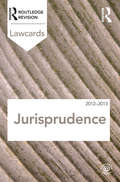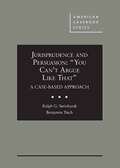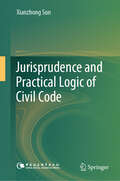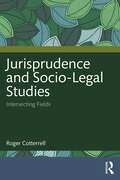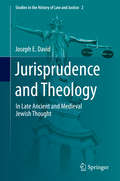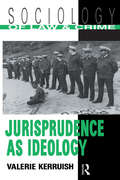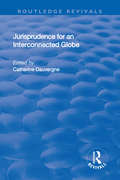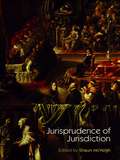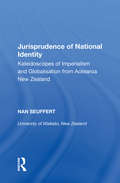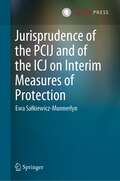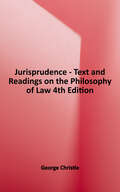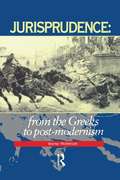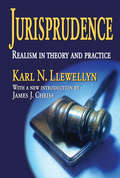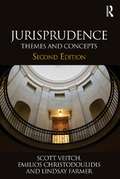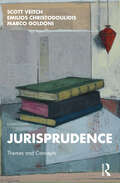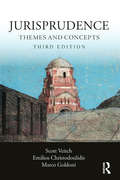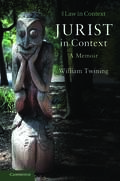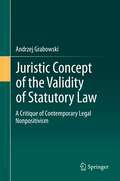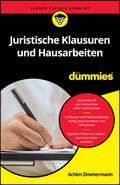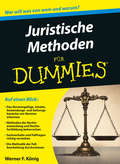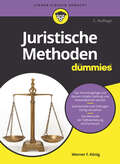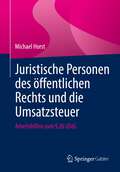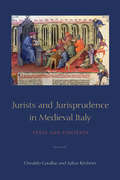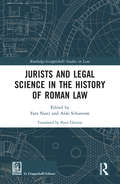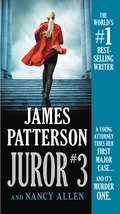- Table View
- List View
Jurisprudence Lawcards 2012-2013 (Lawcards)
by RoutledgeRoutledge Lawcards are your complete, pocket-sized guides to key examinable areas of the undergraduate law curriculum and the CPE/GDL. Their concise text, user-friendly layout and compact format make them an ideal revision aid. Helping you to identify, understand and commit to memory the salient points of each area of the law, shouldn’t you make Routledge Lawcards your essential revision companions? Fully updated and revised with all the most important recent legal developments, Routledge Lawcards are packed with features: Revision checklists help you to consolidate the key issues within each topic Colour coded highlighting really makes cases and legislation stand out Full tables of cases and legislation make for easy reference Boxed case notes pick out the cases that are most likely to come up in exams Diagrams and flowcharts clarify and condense complex and important topics '...an excellent starting point for any enthusiastic reviser. The books are concise and get right down to the nitty-gritty of each topic.' - Lex Magazine Routledge Lawcards are supported by a Companion Website offering: Flashcard glossaries allowing you to test your understanding of key terms and definitions Multiple Choice Questions to test and consolidate your revision of each chapter Advice and tips to help you better plan your revision and prepare for your exams Titles in the Series: Commercial Law; Company Law; Constitutional Law; Contract Law; Criminal Law; Employment Law; English Legal System; European Union Law; Evidence; Equity and Trusts; Family Law; Human Rights; Intellectual Property Law; Jurisprudence; Land Law; Tort Law
Jurisprudence and Persuasion: “You Can't Argue Like That” A Case-based Approach (American Casebook Series)
by Ralph Steinhardt Benjamin TeichThis innovative book offers a case-based approach to arguments about the nature of law and persuasion. Its unifying insight is that every decided case has a theory or philosophy within it – whether acknowledged or not – and that there is professional value in developing the skill to discern, articulate, and analyze it. Offering a flexible platform for either an introduction to law and legal reasoning or an in-depth course in jurisprudence and advocacy, the book works first through decided cases and then offers context and depth through the writings of jurists and philosophers. Major themes in the cultural and intellectual history of the law are made accessible and always with a sense of what practical difference they make. Part I enables students to use case analysis to connect with some of the traditional and contemporary schools of jurisprudence across the ideological spectrum (e.g., natural law, positivism, legal realism, law and economics, feminist legal theory, and critical race theory). Part II, in a modern riff on what prior generations of lawyers would have called – without irony or deprecation – 'rhetoric,' analyzes certain identifiable and recurring types of legal arguments, including reasoning by default (e.g., fictions, presumptions, and burdens), recurring fallacies (e.g., begging the question, arguments ad hominem, asserting the consequent), and the nested problems of interpreting statutes and the common law. Understood as the art of argument, it is exactly what lawyers do. Honing it and keeping it respectable is in every law professor’s job description. Part III applies the skills and insights from the rest of the book by applying them in a particular setting, focused on the question whether international law is really 'law' and what turns on that designation.
Jurisprudence and Practical Logic of Civil Code
by Xianzhong SunThis book is a collection of articles that the author has pondered for a long time on the legal theory and practice of China's civil law. It mainly discusses the systematic, scientific and practical issues of Chinese civil law. At the macro level, it covers the relationship between the general provisions and the specific provisions of the Civil Code, the introduction, decline and revival of the Pandekton system in the process of drafting the Civil Code in China, and the important position of the Civil Code in the national governance system; at the meso level, it analyses the legislative arrangement and practical significance of the real right of the Civil Code; at the micro level, it explains the attribute of "unauthorised disposal" and the legal basis for the abolition of this clause in the Contract Law.
Jurisprudence and Socio-Legal Studies: Intersecting Fields
by Roger CotterrellThis book presents a set of related studies aimed at showing key points of intersection and common interest between jurisprudence and socio-legal studies, which are otherwise typically considered distinct fields. It reflects and draws on the author’s work in these areas over more than four decades.The first half of the book explores theoretical issues surrounding the enterprise of socio-legal research, its current scope, and its historical traditions. Some chapters directly compare juristic theory and socio-legal inquiry. Chapters in Part II profile a selection of European jurists whose work offers important insights for socio-legal inquiry. Other chapters frame these studies, explore the history of interactions between jurisprudence and socio-legal research, and show points of convergence between these fields that are increasingly important today. A main aim of the book is to show the current urgency of linking and broadening juristic and social scientific interests in law.Internationally oriented, the book will be of interest to students and researchers in the areas of jurisprudence, legal philosophy, sociology of law, socio-legal studies, and comparative law. It is suitable as supplementary reading for courses in any of these subjects.
Jurisprudence and Theology
by Joseph E. DavidThe book provides in depth studies of two epistemological aspects of Jewish Law (Halakhah) as the 'Word of God' - the question of legal reasoning and the problem of knowing and remembering. - How different are the epistemological concerns of religious-law in comparison to other legal systems? - In what ways are jurisprudential attitudes prescribed and dependent on theological presumptions? - What specifies legal reasoning and legal knowledge in a religious framework? The author outlines the rabbinic jurisprudential thought rooted in Talmudic literature which underwent systemization and enhancement by the Babylonian Geonim and the Andalusian Rabbis up until the twelfth century. The book develops a synoptic view on the growth of rabbinic legal thought against the background of Christian theological motifs on the one hand and Karaite and Islamic systemized jurisprudence on the other hand. It advances a perspective of legal-theology that combines analysis of jurisprudential reflections and theological views within a broad historical and intellectual framework. The book advocates two approaches to the study of the legal history of the Halakhah: comparative jurisprudence and legal-theology, based on the understanding that jurisprudence and theology are indispensable and inseparable pillars of legal praxis.
Jurisprudence as Ideology (Sociology of Law and Crime)
by Valerie KerruishIn Jurisprudence as Ideology, Valerie Kerruish asks how it is that people who are put down, let down and kept down by law can be thought to have a general political obligation to obey it. She engages with contemporary issues in socialist, feminist and critical legal theory, and links these issues to debates in jurisprudence and the philosophy and sociology of law.
Jurisprudence for an Interconnected Globe (Routledge Revivals)
by Catherine DauvergneThis title was first published in 2003.This book explores the interaction of globalization and the development of law. The framework of the book is established by William Twining, who asks how legal concepts can be generalised within a variety of legal orders. This theme is taken up by a group of leading Australian scholars, who produce essays on international economic law, including financial regulation and human rights, and citizenship, migration and crime, under the headings Globalization and the Laws of Money, Globalization and the Laws of People, Globalization, Cultures and Comparisons. This collection marks an important step towards the construction of a jurisprudence for a connected, but still culturally diverse, globe.
Jurisprudence of Jurisdiction
by Shaun McVeighFor much of the history of the western legal order, jurisdiction has been the first question of law. This book investigates the difference that jurisdiction continues to make to the ordering of normative existence. It also follows the speculation that without an account of jurisdiction, jurisprudence would be left speechless, with no power to address the conditions of attachment to legal and political order. The starting point of this book lies with the claim that a sharper focus can be given to normative legal ordering through questions of jurisdiction than can be through those of moral responsibility or social action. This is so because jurisdiction articulates both the potentiality of law and the conditions of its exercise. It provides the idiom of response to the fact that there is law and to the fact that law institutes, judges and addresses a form of life. From this viewpoint the contributors to this book examine the institution of human rights, the new global and national orders of sovereign power and of trade and information, the judgment and government of death and desire, and the address of colonial and post-colonial legal idioms. In doing this the contributors also provide for the elaboration of questions of jurisdiction as part of the resources and repertoires of jurisprudence. This book provides a point of entry to an emergent genre of writing within doctrinal, historical and critical jurisprudence that has returned to questions of jurisdiction to think again about juridical order and change. In so doing, it also points to questions that must be asked for there to be any interdisciplinary study that addresses law.
Jurisprudence of National Identity: Kaleidoscopes of Imperialism and Globalisation from Aotearoa New Zealand
by Nan SeuffertPresenting a unique blend of historical and contemporary research from a range of interdisciplinary and theoretical analysis, this book examines the intersection of 'race', gender and national identity. Focusing on New Zealand, the book highlights the ways in which shifts in national identity shape and limit legal claims for redress for historical racial injustices internationally. Key features: * Analyzes the identity configurations produced by New Zealand's process of 'settling' colonial injustices and highlights the wider relevance for other groups such as Australian aborigines and Native Americans. * Traces the connections and discontinuities between the free trade imperialism of the mid-19th Century and the Free Trade Globalization of the late 20th Century. * Rich, rigorous interdisciplinarity and use of a range of theoretical perspectives provides insights relevant to legal theorists, feminists and legal scholars internationally.
Jurisprudence of the PCIJ and of the ICJ on Interim Measures of Protection
by Ewa Sałkiewicz-MunnerlynThis book deals with all the cases that came before the Permanent Court of International Justice (PCIJ) from 1922 to 1946, as well as those that were heard by its successor, the International Court of Justice (ICJ) from 1946 to 2020 in which interim measures of protection were either indicated or refused. The monograph shows how cases in which injunctive relief was sought were handled and how the PCIJ and the ICJ have undergone certain reforms over the years. The new approach taken by the author is to present all the matters brought before both the PCIJ and ICJ in full and to present the new requirements on the part of the ICJ that have been formulated in recent years. The book is aimed at law students, lecturers and those working in the field of international law.Ewa Sałkiewicz-Munnerlyn was a Polish diplomat working for the Ministry of Foreign Affairs from 1991 to 2018. She was appointed charge d’affaires at the Polish Embassy to the Holy See from 1993-1994, after which she served as the Polish consul at the Consular Division of the Polish Embassy in Washington D.C. from 1995-1999. She then held the position of Human Rights Officer of the OSCE in Macedonia (Skopje and Ohrid) and Bosnia and Hercegovina (Pale in Republika Srbska) from 2001-2005 and has also several times worked as a short-term observer of the OSCE during parliamentary and presidential elections in Ukraine, Russia, Moldova and Belarus. She attained a Ph.D. at the Jagiellonian University in Krakow, Poland and a post-graduate diploma at the Institut des Hautes Etudes Internationales in Geneva, Switzerland.
Jurisprudence, Text and Readings on the Philosophy of Law (American Casebook Series)
by George G. ChristieThis book is designed for use in courses in law schools and university departments of philosophy. It can serve as a text for basic and advanced courses and seminars. Readings include excerpts of classic works of Aristotle, Aquinas, Locke, Hobbes, Kant, Bentham, and Austin. Also included are excerpts from standard works of twentieth-century philosophers. The book explores current legal discourse with readings on topics such as sociobiology, Islamic law, the legal process school, legal feminism, critical legal studies, intersectionality and gender identity theories, law and economics, and new private law theories. It reprints leading cases on natural rights/human rights and readings from online blogs, op-ed essays, news stories and internet publications, as well as drawing on literary treatment of topics relevant to legal philosophy.
Jurisprudence: From The Greeks To Post-Modernity
by Wayne MorrisonThis challenging book on jurisprudence begins by posing questions in the post-modern context,and then seeks to bridge the gap between our traditions and contemporary situation. It offers a narrative encompassing the birth of western philosophy in the Greeks and moves through medieval Christendom, Hobbes, the defence of the common law with David Hume, the beginnings of utilitarianism in Adam Smith, Bentham and John Stuart Mill, the hope for enlightenment with Kant, Rousseau, Hegel and Marx, onto the more pessimistic warnings of Weber and Nietzsche. It defends the work of Austin against the reductionism of HLA Hart, analyses the period of high modernity in the writings of Kelsen, Hart and Fuller, and compares the different approaches to justice of Rawls and Nozick. The liberal defence of legality in Ronald Dworkin is contrasted with the more disillusioned accounts of the critical legal studies movement and the personalised accounts of prominent feminist writers.
Jurisprudence: Realism in Theory and Practice (The\civilization Of The American Indian Ser. #21)
by Karl LlewellynJurisprudence: Realism in Theory and Practice compiles many of Llewellyn's most important writings. For his time, the thirties through the fifties, Llewellyn offered fresh approaches to the study of law and society. Although these writings might not seem innovative today, because they have become widely applied in the contemporary world, they remain a testament to his. The ideas he advanced many decades ago have now become commonplace among contemporary jurisprudence scholars as well as social scientists studying law and legal issues.Legal realism, the ground of Llewellyn's theory, attempts to contextualize the practice of law. Its proponents argue that a host of extra-legal factors--social, cultural, historical, and psychological, to name a few--are at least as important in determining legal outcomes as are the rules and principles by which the legal system operates. Oliver Wendell Holmes, Jr., book, The Common Law, is regarded as the founder of legal realism. Holmes stated that in order to truly understand the workings of law, one must go beyond technical (or logical) elements entailing rules and procedures. The life of the law is not only that which is embodied in statutes and court decisions guided by procedural law. Law is just as much about experience: about flesh-and-blood human beings doings things together and making decisions.Llewellyn's version of legal realism was heavily influenced by Pound and Holmes. The distinction between ""law in books"" and ""law in action"" is an acknowledgement of the gap that exists between law as embodied in criminal, civil, and administrative code books, and law. A fully formed legal realism insists on studying the behavior of legal practitioners, including their practices, habits, and techniques of action as well as decision-making about others. This classic studyis a foremosthistorical work on legal theory, and is essential for understanding the roots of this influential perspective.
Jurisprudence: Themes and Concepts
by Lindsay Farmer Scott Veitch Emilios ChristodoulidisJurisprudence: Themes and Concepts offers an original introduction to, and critical analysis of, the central themes studied in jurisprudence courses. The book is presented in three parts each of which contains General Themes, Advanced Topics, tutorial questions and guidance on further reading: Law and Politics, locating the place of law within the study of institutions of government Legal Reasoning, examining the contested nature of the application of law Law in Modernity, exploring the social forces that shape legal development. This second edition includes enhanced discussion of the rise of legal positivism within the context of the rise of the modern state, the changing role of natural and human rights discourse, concepts of justice in and beyond the nation state, the impact of emergency doctrines in contemporary legal regulation, and challenges to the rule of law in light of shifting and competing demands for new types of social solidarity. Accessible, interdisciplinary, and socially informed this book has been revised to take into account the latest developments in jurisprudential scholarship.
Jurisprudence: Themes and Concepts
by Scott Veitch Emilios Christodoulidis Marco GoldoniJurisprudence: Themes and Concepts offers an original introduction to, and critical analysis of, the central themes studied in jurisprudence courses. The book is organised in three parts: Part I sets out the key elements of modern law and their relation to political, economic, and social conditions. Part II presents competing accounts of the nature of legal validity, legality, legal reasoning, and justice. Both parts feature corresponding tutorial questions. Part III contains advanced topics including chapters on legal pluralism, law and disciplinary power, and law and the Anthropocene. Every chapter gives guidance on further reading. This fourth edition has been fully revised and updated to take into account the latest developments in jurisprudential scholarship. Additional material is included in the coverage of social law, colonialism and critical race theory, the challenges of digital technology and the emergence of new legal subjects. Accessible, interdisciplinary and socially informed, Jurisprudence: Themes and Concepts is essential reading for all students of jurisprudence and legal philosophy.
Jurisprudence: Themes and Concepts (Critical Studies In Jurisprudence Ser.)
by Scott Veitch Emilios Christodoulidis Marco GoldoniJurisprudence: Themes and Concepts offers an original introduction to, and critical analysis of, the central themes studied in jurisprudence courses. The book is presented in three parts: the first two contain general themes with corresponding tutorial questions, and the third part contains advanced topics. Each chapter gives guidance on further reading. Accessible, interdisciplinary, and socially informed, this book has been revised to take into account the latest developments in jurisprudential scholarship.
Jurist in Context: A Memoir (Law in Context)
by William TwiningThis is the engaging and accessible intellectual memoir of a leading jurist. It tells the story of the development of his thoughts and writings over sixty years in the context of three continents and addresses the complexities of decolonisation, the troubles in Belfast, the contextual turn in legal studies, rethinking evidence and the implications of globalisation which have been central to his life and research. In propounding his original views as an enthusiastic self-styled 'legal nationalist', Twining maps his ideas of law as a unique discipline, which pervades all spheres of social and political life while combining theory and practice, concepts and values, facts and rules in uniquely fascinating ways. Addressed to academic lawyers generally and to other non-specialists, this story brings out the importance and fascinations of a discipline that has changed, expanded and diversified in the post-War years, with an eye to its future development and potential.
Juristic Concept of the Validity of Statutory Law: A Critique of Contemporary Legal Nonpositivism
by Malgorzata Kieltyka Andrzej GrabowskiThis book presents the theory of the validity of legal norms, aimed at the practice of law, in particular the jurisdiction of the constitutional courts. The postpositivist concept of the validity of statutory law, grounded on a critical analysis of the basic theories of legal validity elaborated up to now, is introduced. In the first part of the book a contemporary German nonpositivist conception of law developed by Ralf Dreier and Robert Alexy is analysed in order to answer the question whether the juristic concept of legal validity should include moral standards or criteria. In the second part, a postpositivist concept of legal validity and an innovative model of validity discourse, based on the juristic presumption of the validity of legal norms, are proposed. The book is a work on analytical legal theory, written from a postpositivist, detached point of view.
Juristische Klausuren und Hausarbeiten für Dummies (Für Dummies)
by Achim ZimmermannSouverän in Klausur und Hausarbeit punkten! Sie müssen in Ihrem Jurastudium eine Hausarbeit oder eine Klausur schreiben? Dabei ist nicht nur Fachwissen gefragt. Dieses Buch hilft Ihnen, die juristischen Methoden sicher zu beherrschen, die richtigen Schwerpunkte zu setzen und systematisch zu argumentieren. Lernen Sie, wie Sie gut strukturierte Texte schreiben und die richtigen juristischen Formulierungen anwenden. Achim Zimmermann verrät Ihnen außerdem, welche Fehler zu Punktabzügen führen, welche Formalien Sie bei Hausarbeiten beachten müssen und wie Sie bei Klausuren punkten können. Sie erfahren Was Gutachten- und Urteilsstil unterscheidet Wie Sie ein cleveres Zeitmanagement entlasten kann Wie Sie richtig zitieren Wie Sie mit Microsoft Word Ihrer Hausarbeit eine klare Struktur geben
Juristische Methoden für Dummies
by Werner F. KönigStehen Sie gerade am Anfang eines Jura-Studiums? Oder müssen Sie sich als Nicht-Jurist im Nebenfach mit Jura beschäftigen? Ist Ihnen die juristische Methodik noch fremd und fühlt sie sich für Sie gewöhnungsbedürftig an? Das muss nicht so bleiben! Dieses Buch führt Sie in die Logik der Juristerei ein und erklärt Ihnen in gewohnt verständlicher und anschaulicher Dummies-Manier die Welt der Normengefüge, Sachverhalte und Fallfragen, Auslegung und Fallbearbeitung. Und ganz nebenbei erfahren Sie auch, welche juristischen Todsünden Sie auf keinen Fall begehen sollten.
Juristische Methoden für Dummies (Für Dummies)
by Werner F. KönigStehen Sie gerade am Anfang eines Jura-Studiums? Oder müssen Sie sich als Nicht-Jurist im Nebenfach mit Jura beschäftigen? Ist Ihnen die juristische Methodik noch fremd und fühlt sie sich für Sie gewöhnungsbedürftig an? Das muss nicht so bleiben! Dieses Buch führt Sie in die Logik der Juristerei ein und erklärt Ihnen in gewohnt verständlicher und anschaulicher Dummies-Manier die Welt der Normengefüge, Sachverhalte und Fallfragen, Auslegung und Fallbearbeitung. Und ganz nebenbei erfahren Sie auch, welche juristischen Todsünden Sie auf keinen Fall begehen sollten.
Juristische Personen des öffentlichen Rechts und die Umsatzsteuer: Arbeitshilfen zum § 2b UStG
by Michael HorstDas Buch enthält eine Auswahl an Themen, welche für umsatzsteuerliche Würdigung im Alltag von jPdöR - besonders für die Gebietskörperschaften - von Bedeutung sind. §2b UStG wird aus Sicht einer Gebietskörperschaft dargestellt. Dabei orientiert sich das Buch an einem städtischen Haushalt. Praktische Arbeitshilfen und Beispiele ermöglichen den Transfer auf die individuellen kommunalen Umsätze.
Jurists and Jurisprudence in Medieval Italy: Texts and Contexts (Toronto Studies in Medieval Law)
by Julius Kirshner Osvaldo CavallarJurists and Jurisprudence in Medieval Italy is an original collection of texts exemplifying medieval Italian jurisprudence, known as the ius commune. Translated for the first time into English, many of the texts exist only in early printed editions and manuscripts. Featuring commentaries by leading medieval civil law jurists, notably Azo Portius, Accursius, Albertus Gandinus, Bartolus of Sassoferrato, and Baldus de Ubaldis, this book covers a wide range of topics, including how to teach and study law, the production of legal texts, the ethical norms guiding practitioners, civil and criminal procedures, and family matters. The translations, together with context-setting introductions, highlight fundamental legal concepts and practices and the milieu in which jurists operated. They offer entry points for exploring perennial subjects such as the professionalization of lawyers, the tangled relationship between law and morality, the role of gender in the socio-legal order, and the extent to which the ius commune can be considered an autonomous system of law.
Jurists and Legal Science in the History of Roman Law (Routledge-Giappichelli Studies in Law)
by Fara NastiThis book provides a new approach to the study of the History of Roman Law. It collects the first results of the European Research Council Project, Scriptores iuris Romani - dedicated to a new collection of the texts of Roman jurisprudence, highlighting important methodological issues, together with innovative reconstructions of the profiles of some ancient jurists and works. Jurists were great protagonists of the history of Rome, both as producers and interpreters of law, since the Republican Age and as collaborators of the principes during the Empire. Nevertheless, their role has been underestimated by modern historians and legal experts for reasons connected to the developments of Modern Law in England and in Continental Europe. This book aims to address this imbalance. It presents an advanced paradigm in considering the most important aspects of Roman law: the Justinian Digesta, and other juridical late antique anthologies. The work offers an historiographic model which overturns current perspectives and makes way for a different path for legal and historical studies. Unlike existing literature, the focus is not on the Justinian Codification, but on the individualities of ancient Roman Jurists. As such, it presents the actual legal thought of its experts and authors: the ancient iuris prudentes. The book will be of interest to researchers and academics in Classics, Ancient History, History of Law, and contemporary legal studies.
Juror #3
by James Patterson Nancy AllenA young attorney tries her first case . . . and it's Murder One in a legal thriller from the world's #1 bestselling writer. <P><P>Ruby Bozarth, a newcomer to Rosedale, Mississippi, is also fresh to the Mississippi Bar--and to the docket of Circuit Judge Baylor, who taps Ruby as defense counsel in a racially charged felony. <P><P> The murder of a woman from one of the town's oldest families has Rosedale's upper crust howling for blood, and the prosecutor is counting on Ruby's inexperience to help him deliver a swift conviction. Ruby's client is a college football star who has returned home after a career-ending injury, and she is determined to build a defense that will stick. She finds help in unexpected quarters from Suzanne, a hard-charging attorney armed to the teeth, and Shorty, a diner cook who knows more than he lets on. <P><P> Ruby never belonged to the country-club set, but once she nearly married into it. As news breaks of a second murder, Ruby's ex-fiancé, Lee Greene, shows up on her doorstep--a Southern gentleman in need of a savior. As lurid, intertwining investigations unfold, no one in Rosedale can be trusted, especially the twelve men and women impaneled on the jury. They may be hiding the most incendiary secret of all. <P><b>A New York Times Bestseller</b>
